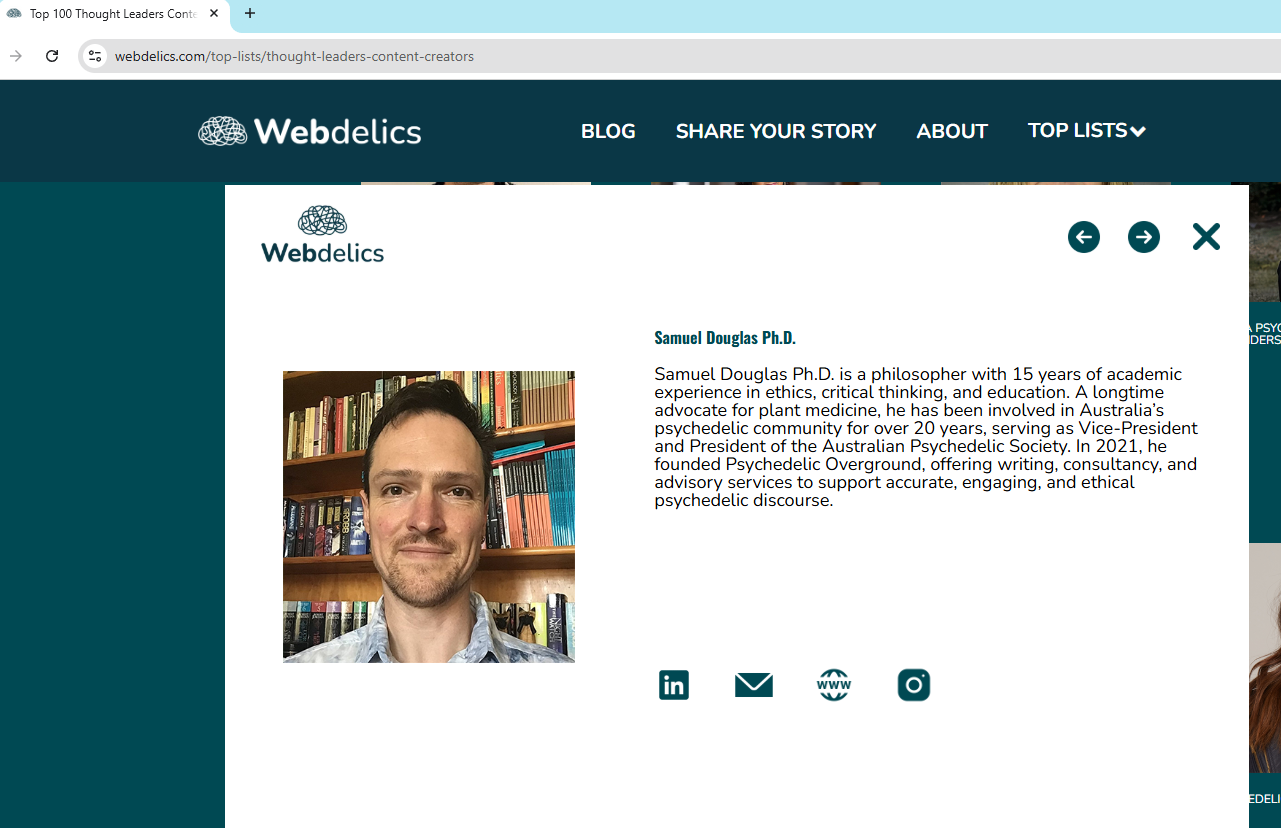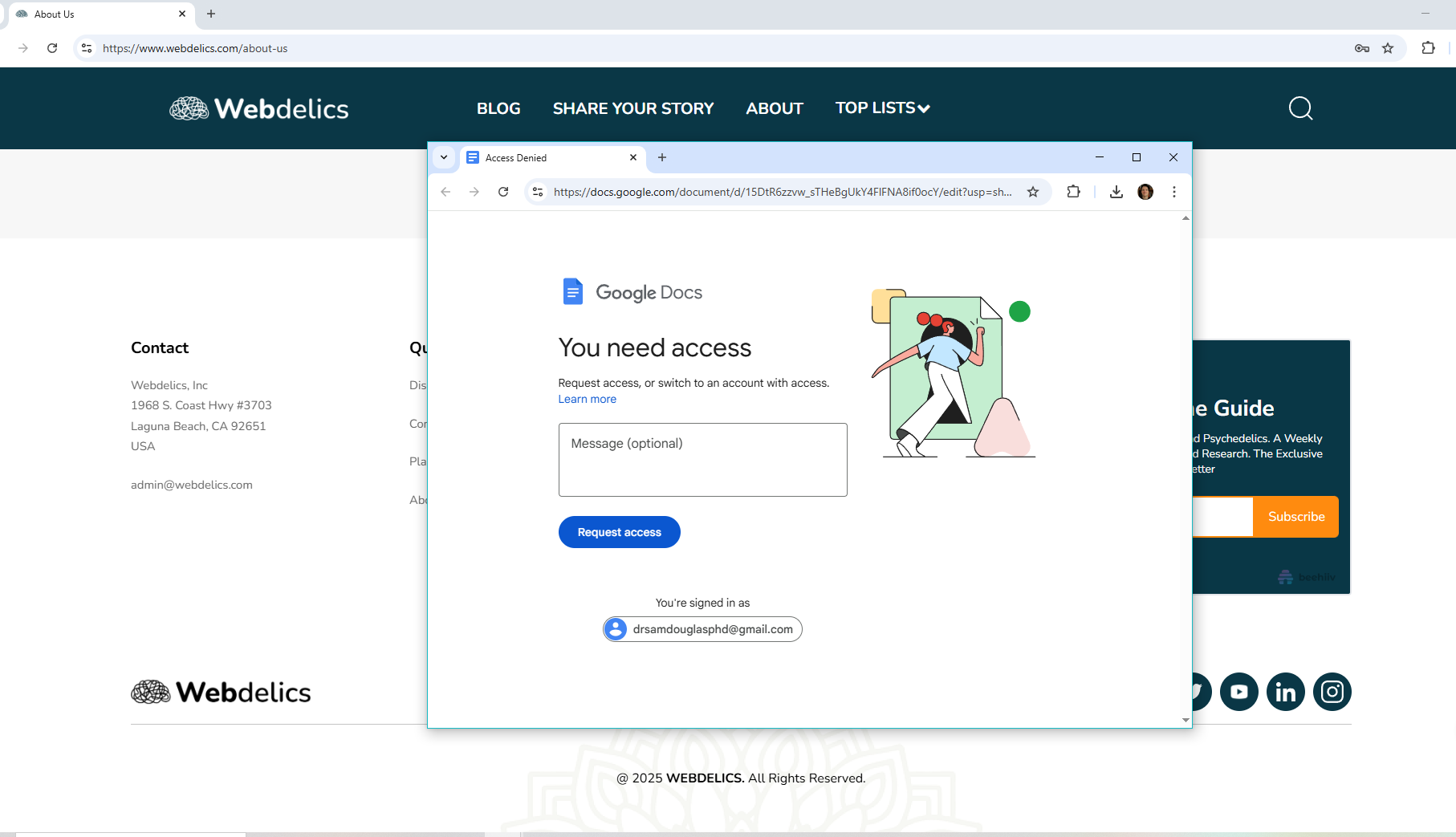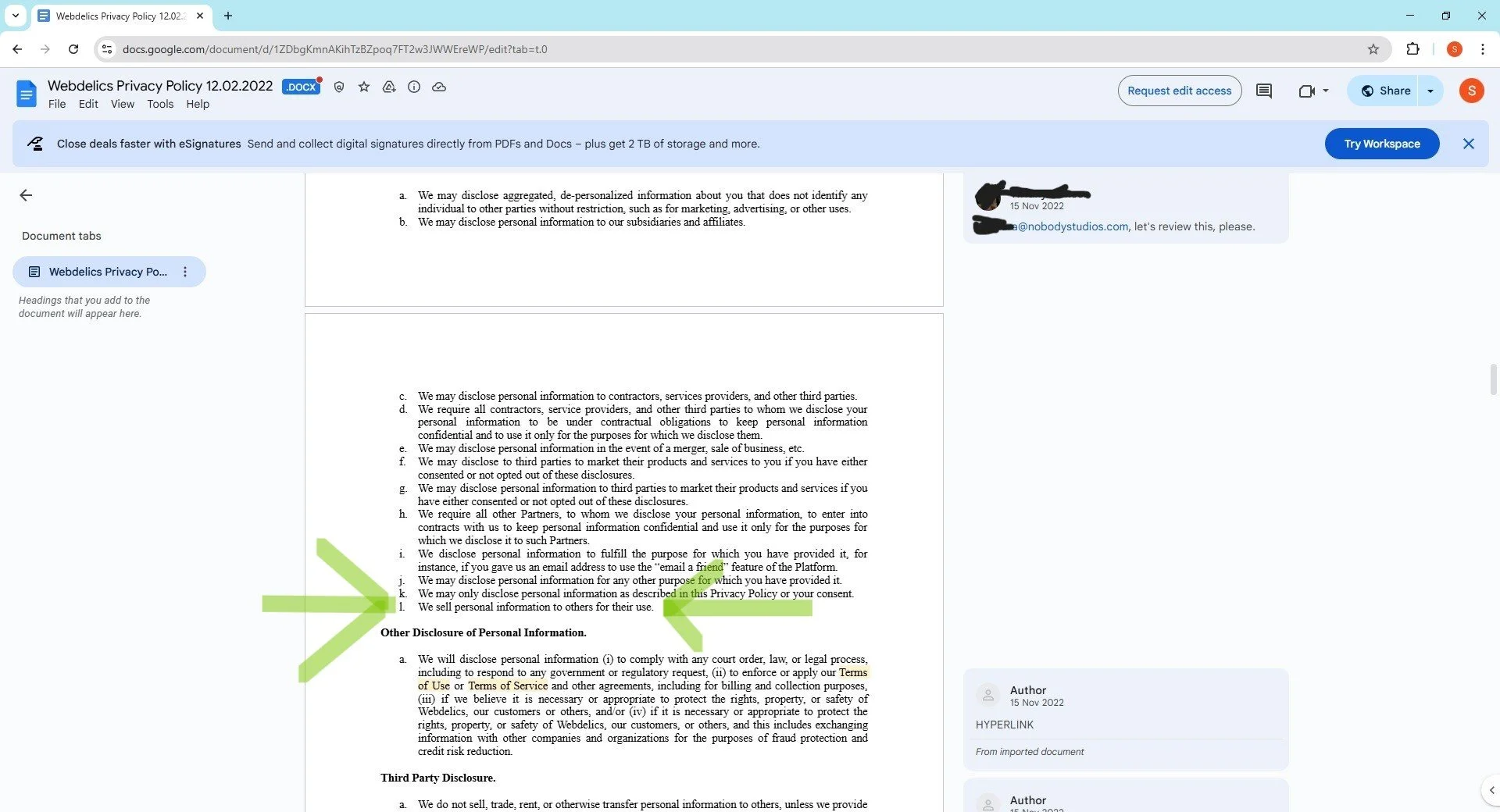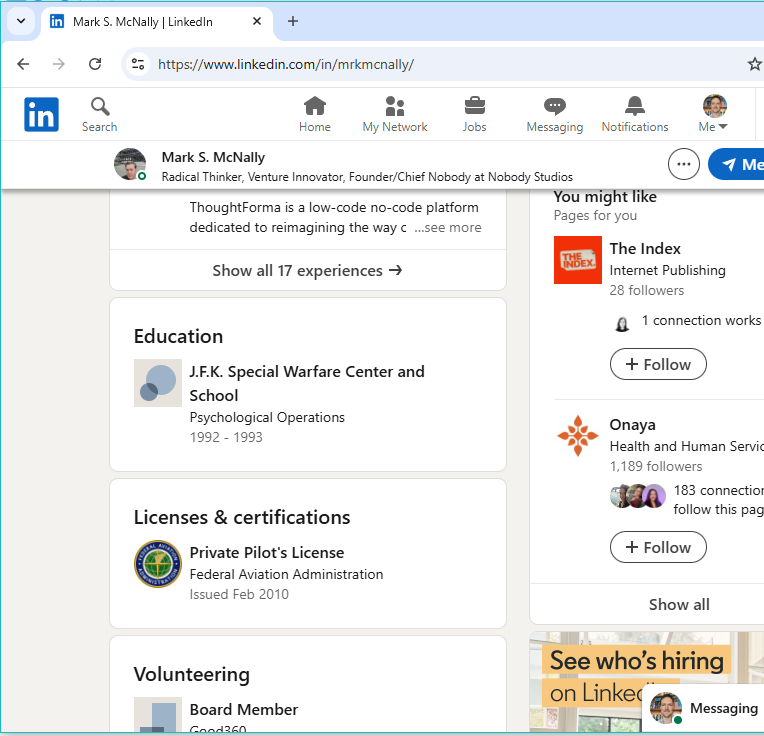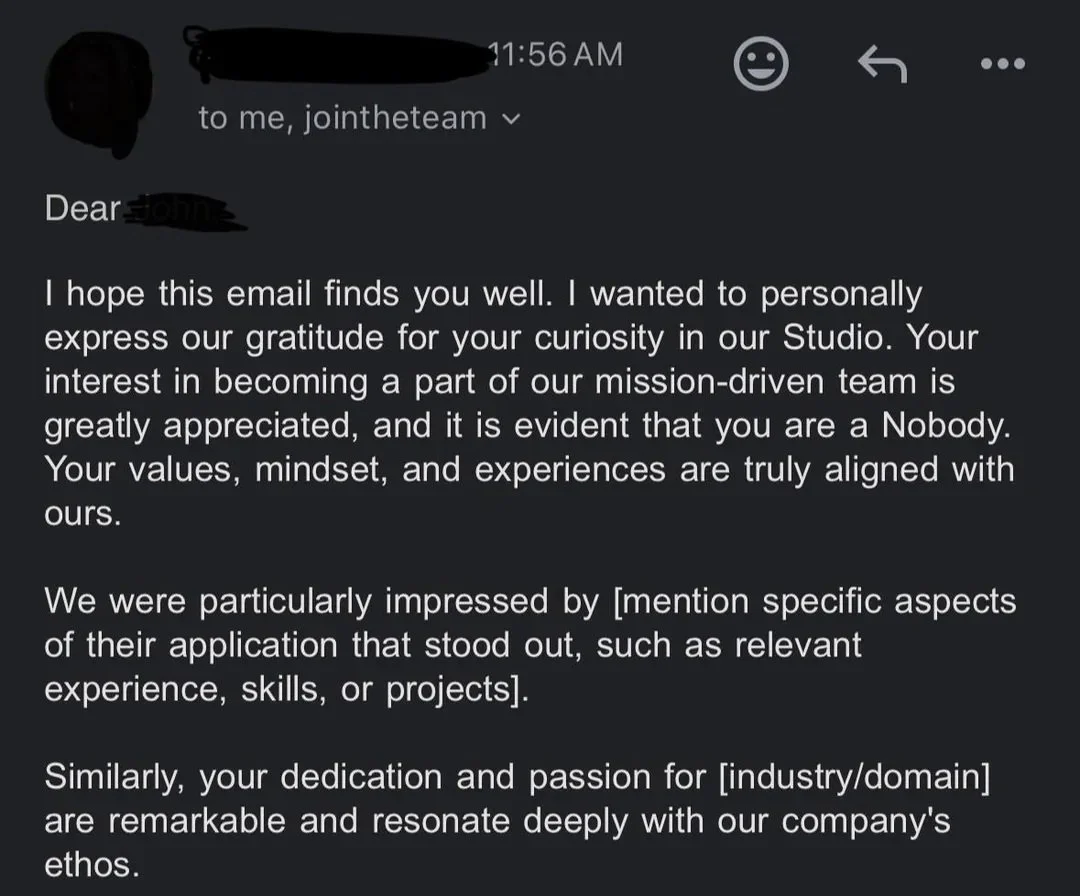Thought Leader, Clickbait or Something Weirder?
A couple of months ago, I got an email from a company called Webdelics, informing me I’d made their “Top 100 Psychedelic Thought Leaders” list. As a writer and philosopher, being named as a Thought Leader was extremely flattering, twice.
Yes, I definitely still look exactly like this.
But literally the moment I opened the email, my first alarm bell went off.
It was: “Hi {First Name},”
I could put this to one side as the rest of the email was pretty good and said all the right things. I was part of a distinguished group they’d searched far and wide for. I’d made a positive impact through my specialised focus and body of work.
Utter catnip to my need for external validation.
Sure, the bio wasn’t totally up to date. And the personalised web asset they’d made so I could help celebrate my achievement was locked so I couldn’t download it. But the other 99 people made up a group that I’d largely be thrilled to be part of. Still, I smelled a PR exercise. That’s OK. If Webdelics needed to get traction for whatever it was doing, there are worse ways to get it, and properly done, this list should have worked well.
Without giving too much of the content of those emails away, I noted that my bio wasn’t super up to date (i.e., it was missing my EPIC work), pointed out the problems with the address field (and gently chided them for what I took to be a rookie mistake) and congratulated them on the clever bit of marketing, despite my opinion that it was not especially subtle.
I probably would have all of it go, other than a couple of details. One was that everyone in the email chain (other than me) had nobodystudios.com emails. The other was the refusal to admit that the exercise was for any reason other than furthering the cause, and reiteration that Webdelics existed purely to educate people about psychedelics and plant medicines.
Now, perhaps I’ve become cynical. Or, perhaps, I’ve done enough paid and volunteer work in psychedelics to have the opinion that commercial entities never do anything purely “for the cause.” This is not wrong in and of itself. I, for example, hope that someone who reads this will feel inspired to hire me for my services, support me via Buy Me a Coffee, or at least subscribe to my newsletter, The Ethical Trip. Either way, I resolved to put Webdelics under the microscope, out of professional curiosity, if nothing else. What was their revenue model? How was it going to actually make money?
In looking over the Webdelics website, I noted that its official line is: “Webdelics is a platform devoted to educating people about psychedelics: their benefits, considerations, and many applications.” What this leaves out actually says a lot. For example, Third Wave, who I wrote a lot for a few years back, is upfront about the services it provides. You don’t even have to scroll – it’s right there in the hero section, along with a video of Paul Austin doing his own thought-leader thing. The statement from Webdelics isn’t a plan, it’s a vibe, and a vague one at that.
I reasoned, unless Webdelics is a charity or philanthropic project of someone with cash to burn, there will some angle where it eventually generates revenue. So, I went looking. I didn’t find an answer on their website. What I did find was what I’d normally see as red flags; lack of attention to details that I’d take to indicate that something wasn’t quite right.
The first was when I went to check their terms and conditions. The link went to a google doc set to private.
How odd.
I checked the privacy policy. This went to a google doc I could access, at least. Obviously copied from elsewhere, but that’s normal – why reinvent the wheel? But it clearly had been a work in progress that hadn’t moved much since early 2022, if the staff comments were anything to go on. On the upside, it answered my question about potential monetization, as there were clauses about providing user information to third parties for the purposes of targeted advertising or product offers.
Other than the half-done nature of the document, there was one gem, hidden a little further down, under “Disclosure of personal information.”
It was this, 8.l: “We sell personal information to others for their use.”
Um, what?
This is unusual. So unusual, that very few websites have something so blunt. I’m not saying this is anything other than a clause that should have been deleted or reworded, not least as the other clauses aim to place restrictions on what third parties can use the information for. But it certainly contributed to the overall impression I got that it was all a bit, as we would say in Australia, half-assed.
Put this alongside their social media channels that have small followings and underwhelming engagement, and Webdelics looks like it’s going nowhere, fast. This was confusing. I mean, if they want to sell advertising or do affiliate marketing, they need to do better than this.
Looking back at the email at this point, I thought that Nobody Studios was a marketing & PR agency that Webdelics had engaged to get things moving again. When I looked at Nobody’s website, I realised I was deeply mistaken. Nobody Studios is a venture studio. A venture studio (also called a startup studio, startup factory, or venture builder) is a company that creates startups in-house, instead of funding external ones like a venture capital firm. Relatively well-known examples of venture studies include Atomic Ventures and Betaworks. This explained why so many people at Webdelics had Nobody Studios emails and (once I checked) worked for both businesses.
Webdelics is one of Nobody’s in-house startups. One of quite a few, since, according to their website, Nobody is aiming to scale 100 companies in five years for “rapid exits”, focussing on quick profitability “because acquisition is the new exit in today’s market.”
I was (and still am) of the opinion that no one is looking to acquire Webdelics any time soon. This sounds more judgmental than it is. Most startups fail, often for reasons outside their founder’s control, and even seasoned professionals at venture studios don’t have a 100% success rate. So, I decided to look at the other nine companies that Nobody listed in their eclectic portfolio.
Of the 10, Sleep Glide, SweatOptions™, Prehab Life™, Ourhomeowners™, Parentipity™ and LootHoundz all had no live websites I could find, almost zero social media, and minimal independent publicity beyond the usual press releases.
Espionage.biz has a “coming soon” placeholder site and not a lot else – or it did until it was recently replaced by a largely blank WordPress site that is strangely reminiscent of the site of an architecture firm in Brussels called études. (No, I don’t know what that means.)
What’s left?
Ovationz, a virtual talent booking agency with a better website but that still indicated lack of attention to detail – some broken internal links, speakers predominately Nobody employees, chunks of lorem ipsum placeholder text hiding away from the landing page.
Evalify, an “AI-powered platform that scores tech startup pitch decks”. To be fair, this looks more like a real business with a real product behind it, despite a lack of reviews or news about funding. If it’s working, though, good luck to them.
And, of course, Webdelics.
So, of 10 companies, there’s maybe one that’s a going concern, Evalify, and even then, I can’t say how well it’s doing in an increasingly crowded field. This didn’t seem to me that Nobody really deserved to be ranked the “number 1 venture studio of 2024”, a claim lurking on the Evalify about page, made by Startup Savant. (Yes, I know maybe I’m out of my lane here, but ranking Nobody ahead of Atomic, the studio that took telehealth brand Hims & Hers to market, where it’s now worth well over $10 billion? I think not.)
Sure, I can’t 100% rule out that the seemingly defunct businesses haven’t been acquired and then mothballed by the new owners. But given that I didn’t see any mention of this, I think it’s safe to say this probably isn’t what happened to them. If someone can present me with proof to the contrary I’ll happily correct the record.
What does all this mean?
I’d hoped to speak to someone at Nobody Studios about all of this. After various delays for a few weeks, some of which, to be fair, were at my end, Nobody VP of Marketing, Rob Voccola, kindly connected me with key figures at Nobody Studios & Webdelics, including Mark S. McNally, “Chief Nobody” and Webdelics “Vision Keeper.”
But once I made it clear that I wanted to ask direct questions about Webdelics’ place in the psychedelic ecosystem and Nobody’s overall strategy, (because I didn’t want to ambush anyone) no one got back to me. I was particularly keen to speak with Mark, because I was dying to ask how his training at the J.F.K. Special Warfare Center and School in Psychological Operations had influenced his work in commercial and, especially, psychedelic spaces. (This isn’t me being facetious – I remain genuinely interested. How often would you get to speak with someone trained in PSYOPS, who’s now operating in the psychedelic sphere?)
(September 2025 update: The Webdelics and Nobody Studios teams and myself have been working to find a time to revisit this - hopefully resulting in an interview I can publish for my readers. But due to work schedules and life events, it hasn’t quite lined up, though all sides are trying. If nothing else I'm impressed that they've been good sports about this, despite my criticism. Anyway, watch this space!)
In the absence of more information, I don’t want to speculate too much. Or if I do, I want to make it very clear that because there might be more going on behind the scenes at these companies, my opinions may not resemble actual reality. Mainly, what I’m left with is questions. Are the companies, including Nobody itself, intended to be real entities that actually produce goods or services, or are they simply placeholders to show potential, waiting for optimistic investors? What does success for Webdelics look like, and, most importantly, how will that benefit actual people who use psychedelics in ways that other organisations aren’t?
While I don’t know the exact details, it looks like Nobody has raised in the ballpark of $4.7 million over the years, according to pitchbook.com, at least. So long as you didn’t spend it too fast, that would keep the lights on for a while. But I also wonder if that money wouldn’t be better spent elsewhere, by supporting nonprofits who undertake genuine on-the-ground community work in education, integration, harm-reduction, and advocacy.
Putting aside the pipedream of rich people giving millions of dollars to my favourite charities simply because it’s the right thing to do, I think about the people I’ve met through my own work in Australia and North & Central America or Dennis Walker’s Mycopreneur incubator – makers and solopreneurs out on the cutting edge of anything from myco-materials to emerging legal products, or academics fighting for scraps of much-needed research funding. Many, if not all, of these people would love to have even a fraction of that $4.7 million to build their projects. Who knows what they might achieve, had this money gone to them instead?
Or I might be utterly wrong. Webdelics and Nobody might be keeping their cards close to their chests, ready to bring forth something that will show my idealist grumbling to be nothing more than the cynical ramblings of an ethicist who’s bitter that they’ve never raised millions of dollars for their good ideas. Until that day, though, I’ll go on what I can find, little titbits like broken websites and not including my name on the email. On that note, in my searches I turned up this gem on Reddit, which is allegedly a response someone got when they enquired with Nobody, looking for work.
Perhaps I should just be happy my name was the only thing they left out.
Until something else comes to light, I’m happy to put Webdelics and Nobody Studios behind me, and concentrate on the real work ahead. Having finally written this up, I feel it’s out of my system.
And who knows, maybe someone in [psychedelics] will read this and be so impressed by my [eye for detail, investigation and analysis] that they reach out to talk work.
Just so long as they don’t address me as {First Name}.
After all, I’m clearly not a nobody.
If you’ve worked with Webdelics, Nobody Studios, or any of its subsidiaries, and have a different perspective, or more to add, my inbox is open. As always, anonymity can be negotiated where appropriate.
Building something real in psychedelics?
I offer ethical consulting, credible content, and plain-language guidance for people doing serious work in this space.
And yes, I will read your privacy policy


